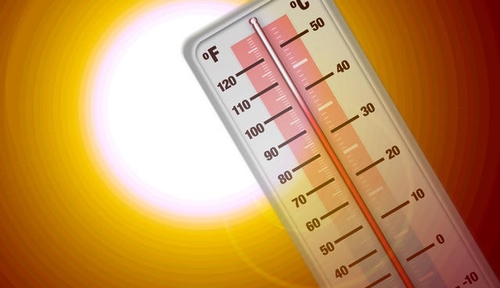The return of hot and humid weather means it is time for energy curtailment.
Why?
Extra heat and humidity means extra stress on campus systems, and in order to make sure everything that needs power and/or cooling gets it, UNMC asks that you reduce power and cooling to things that don’t.
By conserving this energy, we not only ensure that all systems on campus are working, we also help to improve air quality in Omaha and the surrounding area, conserve natural resources, help OPPD to provide services to the entire community and save money.
|
What?
In curtailment mode, all thermostats are locked at 76 degrees, allowing the system to keep all spaces at a tolerable and efficient temperature.
UNMC also eliminates the ability to heat in any space — it’s surprising how many areas use both heating and cooling simultaneously to keep a space comfortable and at the correct air pressure. Eliminating the heating source during curtailment allows UNMC to use less cooling energy to offset the simultaneous heating — saving on both. This means there may actually be some spaces on campus that are almost cold during these times, but that is the most energy efficient way to operate those particular spaces.
UNMC contains so many different types of systems that it is tough to truly categorize and explain what operational strategy is most efficient for each space, but Facilities looks at each type of system individually and makes those decisions.
Who does this affect?
The entire campus is being asked to help out — however all lab, patient, and animal areas are exempt. Although these spaces are actually the most energy intensive, for now they will remain unaffected. Any other spaces are subject to curtailment.
What can I do to help?
To help ease the cooling load:
- close shades, blinds and curtains whenever possible to reduce solar heat gain;
- lower lighting levels where possible, turn off lights in unoccupied areas and when leaving a room;
- turn off and unplug all electrical equipment not in use (computers, coffee makers, printers, chargers, etc.), especially in offices;
- shut fume hood sashes when not in use; and
- open doors manually instead of using the ADA buttons.

Why don't we do this year round? That makes much more sense.
Our UNMC/TNMC family is very energy-inefficient when entering the DOC from the circle drive. Almost no one uses the revolving door, but instead pushes the button to open the regular door (which stays open for quite a while) resulting not only hot air coming in during summer months and cold air coming in during winter months. That not only wastes energy, but makes it quite uncomfortable for patients waiting for rides in the room.
John Walburn, M.D.
VERY good point, Dr. Walburn! I am guilty of this and will correct my actions!
I am shivering at 67 degrees in our training room right now. I would like to see it locked in at 76, but it doesn't appear to be.
Why do they leave the lights on all day in the parking garage? This is a horrible waste of energy